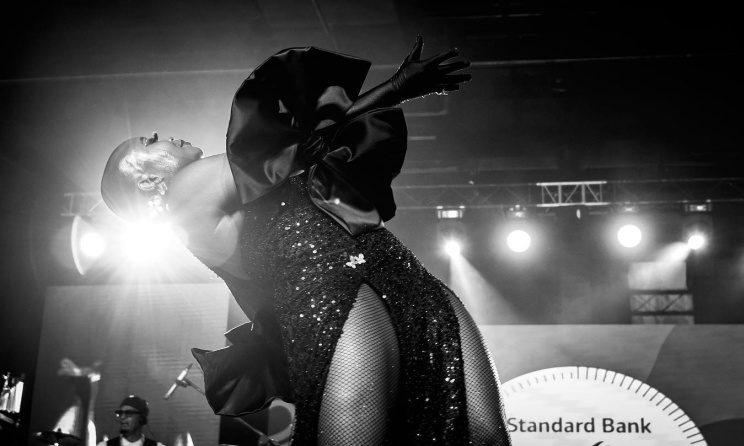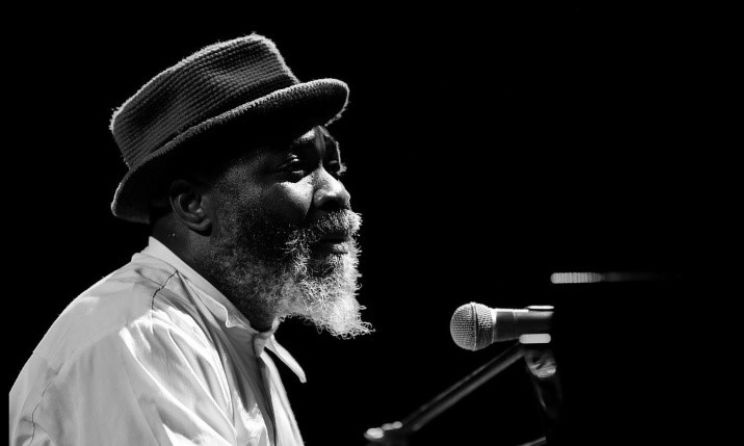Joy of Jazz 2023: Live music as an ancestral invitation to be present
Standard Bank Joy of Jazz festival took place this past weekend, marking its 24th edition. The Sandton Convention Centre was filled to the brim with vibrant energy across all four stages that featured more than 50 artists. Jazz enthusiasts and music lovers alike gathered to celebrate the healing gift of live music.
 Zoë Modiga at Joy of Jazz 2023. Photo: Instagram
Zoë Modiga at Joy of Jazz 2023. Photo: Instagram Nduduzo Makhathini at Joy of Jazz 2023. Photo: Siphiwe Mhlambi
Nduduzo Makhathini at Joy of Jazz 2023. Photo: Siphiwe Mhlambi
Day 1 of the festival saw jazz giants such as Herbie Tsoaeli take centre stage with Dalisu Ndlazi, Viwe Mkizwana and the Afrikan Time Jazz Assembly as they commemorated the living legacy of Johnny Dyani and the homegrown sounds from fertile African soil that have informed the growing landscape of live music.
The second and last day of the festival boasted soul-stirring performances that words cannot quite encapsulate. The Conga Stage saw Zoë Modiga and her band of world-class musicians (as she lovingly describes them) deliver a refined string of songs from her sophomore album Inganekwane. As a unified collective, they rhythmically transported audience members through ancestral invocations of note – their melodic offering requiring nothing of the audience except their presence and attentiveness. If one was not inwardly present during this wide-ranging set, one could have easily missed the intricate meaning and power that rested beneath each instrument and in Modiga’s ground-shaking voice.
It was heartwarming to note the growth of Modiga and her band, who performed their debut album Yellow: The Novel at Joy of Jazz in 2017 on the Mbira Stage. Six years later, Modiga continues to lead the band into musical brilliance that emanates abundant rhythms and melodies. Her rich musicality and stage presence had the audience chanting along (and others shedding heartfelt tears) to her prayerful song ‘Umdali’ that affirms the divinity of the human spirit by reminding us that:
Bayasidinga
Basicelile
Likhonithemb’uku’thamaphuphu abo
azofekeka
Njengoba kush’ uMdali
The above Zulu lyrics loosely translate into English as: “Those who came before us need us/Those who came before us have called us/There is hope that their dreams will come true/Just like the Creator said”
The Nduduzo Makhathini Trio, a band of brothers consisting of Cuban drummer Francisco Mela and bassist Zwelakhe-Duma Bell le Pere with Nduduzo Makhathini on piano and vocals kept the streak of transcendent hymns going with their medley of songs off In The Spirit of Ntu album on the Dinaledi Stage. The trio featured Omagugu Makhathini who brought a divinely feminine and grounding touch to the stage with her resonant voice.
Their performance flowed in and out of the bounds of time and revealed an evocatively powerful and ancient truth: there is a deeply spiritual place unseen where the songs are happening. As we collectively sing, dance and feel the music, we are tapping into the ongoing ancestral portal of music. One could say that a pianist or composer does not necessarily nor tangibly make music, instead they compose various parts of themselves in order to see and hear where the music takes them. The compositions are in fact meditations of the self and the spirit that gradually lead the artist to the song. It is at this intersection that jazz and improvisation build a home.
The two performances by Zoë Modiga and the Nduduzo Makhathini Trio were a necessary reminder of the fact that when one hears a song that moves them, one should allow the melody and rhythm to resonate on a deeper level of consciousness. This level of deep presence brings to light how the music itself has something specific to share too, with each individual. The songs themselves are messengers or “Zithunyiwe lezingoma”, in Makhathini’s words.
Standard Bank Joy of Jazz festival remains a cultural space that positions itself in alignment with heritage. Taking place in September, it coincides with the beginning of the African New Year (Inzalo ye Langa). The month of September has been regarded and honoured as the first month of the African New Year by the indigenous people of Southern Africa. According to age-old indigenous practices, the ancestors counted the calendar based on the movement of the sun, which provided them with the knowledge and wisdom of when the seasons would change.
September, or uMandulo in Zulu, is believed to be the start of a new cycle, representing the welcoming of blessings in the form of rain, vegetation and growth in all aspects of the human experience. The sacred connection between cosmic events, such as the beginning of the African New Year, and spiritual pursuits, such as the singing and playing of spiritual hymns, is one to be honoured and celebrated. The jazz was indeed felt, in this realm and the next.
The Lounge Jazz Stage also featured a one-of-a-kind market experience called the Jazzy Joburg Market – an African market selling a wide range of traditional attire, creations and jewellery. Those who wandered into the market could purchase all kinds of African fashion items to further honour and celebrate their roots.




















Commentaires
s'identifier or register to post comments